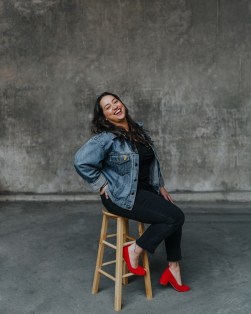By Brittany Tiplady
@yellowbird888
The Growing Room Literary and Arts Festival kicks off on March 11 with a robust, four-day program of panels, readings, screenings and workshops.
“Room is committed to deepening our learning about inclusion and accessibility, both within the systemic structures of the festival and the creative curation. Growing Room is a celebration, a protest, a reflection, a re-visioning, a gathering, a question, and a dream.”
At the helm of the 2020 festival is the incomparable Jessica Johns, the current managing editor of Room Magazine and the co-organizer of the Indigenous Brilliance reading series.
We spoke with Johns to learn more about the festival and her time leading the event, and how this labour of love has been a true collaboration of community.
I see that it’s the fourth year of the Growing Room festival, how does it feel to be at the helm of this relatively new, but very important festival for the first time?
“Really exciting. We are still very young; we are only a little toddler festival. I was a volunteer for the first-ever Growing Room festival in 2017 in the hospitality [department], which has now grown and a paid position which is really wonderful. It’s been really exciting to see this festival grow in all the ways that it has. I feel very humbled to be in the position that I am now and to be curating and organizing in such a substantial capacity.
I know that you’re the managing editor of Room magazine and a co-organizer of the Indigenous Brilliance Reading Series. how has that work impacted the direction of your leadership of this festival?
Quite significantly. The Indigenous Brilliance portion of the festival has always been a really big aspect. Indigenous Brilliance is now three years old, so it was in 2018 that we introduced ourselves as a reading series and it was at the Growing Room Festival that we had our first event. So, Growing Room for Indigenous Brilliance itself is a really big milestone, it’s always our birthday. And that has expanded in really big and wonderful ways. Last year, we had a full-day Indigenous Brilliance event, and we are doing the same thing this year. It’s such a generative and loving and really wonderful space to be in. This year, we have a reading in the early afternoon…and after that we will be screening The Body Remembers When The World Broke Open. This is especially exciting because we have not shown a film at the festival yet. The screening is also going to be followed by a discussion with Jade Baxter and Justin Ducharme who are two Indigenous filmmakers; they are so brilliant and they will be discussing Indigenous film and Indigenous representation in film in general.
And then closing out all of the Growing Room on March 15, and the full-day of Indigenous Brilliance, is an evening event called After Glow: Tongue & Cheek. It’s featuring really wonderful performers; musicians, burlesque and drag, and that’s going to be just amazing.
I just registered myself a ticket for the On Money and Writing: An Intersectional Conversation About Creative Survival panel!
Yay! It’s so important and really great to have events that are talking about craft and other forms are storytelling but it’s also really important to have these discussions about the practicality of the art and literary world. It’s almost taboo [to talk about money] in the literary world and making space for that is really important.
I also love the approach to the Transcending the Narrative: Trans Women & Surthrivance panel; how refreshing to see these topics discussed. How did your team approach the programming this year and what were the challenges in creating a truly intersectional event?
The curation took place over a period of five months. It’s just not something we took lightly. We did it with a lot of time and care. We had a seven person programming team and we put forward our own interests and ideas both in panels and events and also in suggesting folks we think would be great to invite.
Because we accept outside pitches and suggestions for [our programming] we accepted nine pitches from the community members. This process was a project in relationality. It was really wonderful to meaningfully incorporate the community in a massive event that I feel is reflective of what people want to see. If you’re going to make something for the community, I think it’s important to involve the community that you’re creating the work for.
Upon accepting those pitches, we worked really closely together to create the best possible thing we could. I think that has allowed us to really show that we do deeply care about the people we’re creating this for and it also allowed us to add and highlight voices that weren’t just our own echo-chamber.

I see that Growing Room even includes an Intro to Burlesque workshop. What pieces of programming excite you the most this year?
So many! I’m really excited about the events this year that focus on storytelling in ways that aren’t strictly literary. So, the Intro To Burlesque workshop is exciting because it’s about movement and bodies and I think that’s really beautiful.
You already mentioned it, but the Transcending the Narrative: Trans Women & Surthrivance event is going to be absolutely amazing. They will be sharing and reading their work and having a discussion and that will be really beautiful to witness.
Radiant Flesh: Black Femme Writing & The Body was one of the events that was pitched to us, which is also happening on Sunday, March 15. We worked with them to build it to what it is now, but it’s their creation and I think that that’s going to be really wonderful. It features Jillian Christmas—her book was just published like a couple days ago; it’s called “The Gospel of Breaking” and it’s going to be huge.
And then of course, I am really excited for Indigenous Brilliance .
As an accomplished writer yourself, what do you think Growing Room means to fellow writers?
I think that for me, in my experience, in going to festivals and things like that, it was really formative for me to go to events where I felt seen or I felt what was being talked about wasn’t disingenuous in any way. So, I really I hope that Growing Room is that [for others as well].
I think it’s really important to go to things that you feel validates your form of art, or your form of storytelling. I hope that our expansion of “literary” by exploring other forms of storytelling such as music, comedy, film, people see that acknowledge that this is storytelling and it deserves a stage too.
How are you taking care of yourself while balancing so much? What have you learned about yourself from this experience?
That’s a really good question and I think it’s important to be honest with these kinds of questions.
I had a really good plan in mind for self-care and boundaries that I wanted to set in terms of when and what time and where I would do this work. I wasn’t great at keeping those boundaries. Planning the festival as well as balancing the managing the editor duties and my own work, I did quite poorly, I think. I didn’t prioritize my own health a lot of the time which was to my detriment.
And other than just [the festival], like everybody else, there’s a million other things going on. There’s worldwide and national grief. And there’s a lot to sort of carry, just personally. But I think one of the biggest things that has been good, even when I haven’t been great about my own boundaries and or like caring for myself, is that I’m very lucky that I have a really wonderful support network that has been able to carry that for me in a lot of ways.
My partner, my kin, my community have been really wonderful in making sure that I had people bringing me food, or my community being like “let’s have a beading day.” And that has been the biggest saving grace for me for over the past year.
I’m not going to speak for the Indigenous community at large, but for me, I think the idea of self-care feels very largely based in capitalist systems. Where it’s focused on on an individual instead of the collective. In my experience and in my life and in my own practice, that’s just not the case. My kin, we care for each other in some deep and collective ways and there’s no shame in asking for that, or getting that, and instead it’s accepting care from other people and giving when you have the capacity.
Anything else you’d like to add about you, the festival, and your work within it?
I’d like to note that our opening night party is called the Movement, which is curated by Jillian Christmas. Jillian curated this to specifically feature black brilliance and black musicians in Vancouver; they’re going to be showcasing their own work, which is such a wonderful, reciprocal thing to witness.
Growing Room takes place on the traditional, unceded, and ancestral territory of the Musqueam, Tsleil-Waututh, and Squamish peoples. 2020 venues include: Emily Carr University of Art & Design, Reliance Theatre, Rennie Hall, Native Education College, Massy Books, Fox Cabaret, The Beaumont Studios. Learn more and register for events here.

Brittany Tiplady is a writer, editor, former ballet teacher, and the co-founder of Loose Lips Magazine. She loves the indoors, fast wifi, collecting maps, and a generous glass of red wine. She’s a self-proclaimed wizard of time management and a notorious loud talker with a penchant for all things Internet and pop culture.




